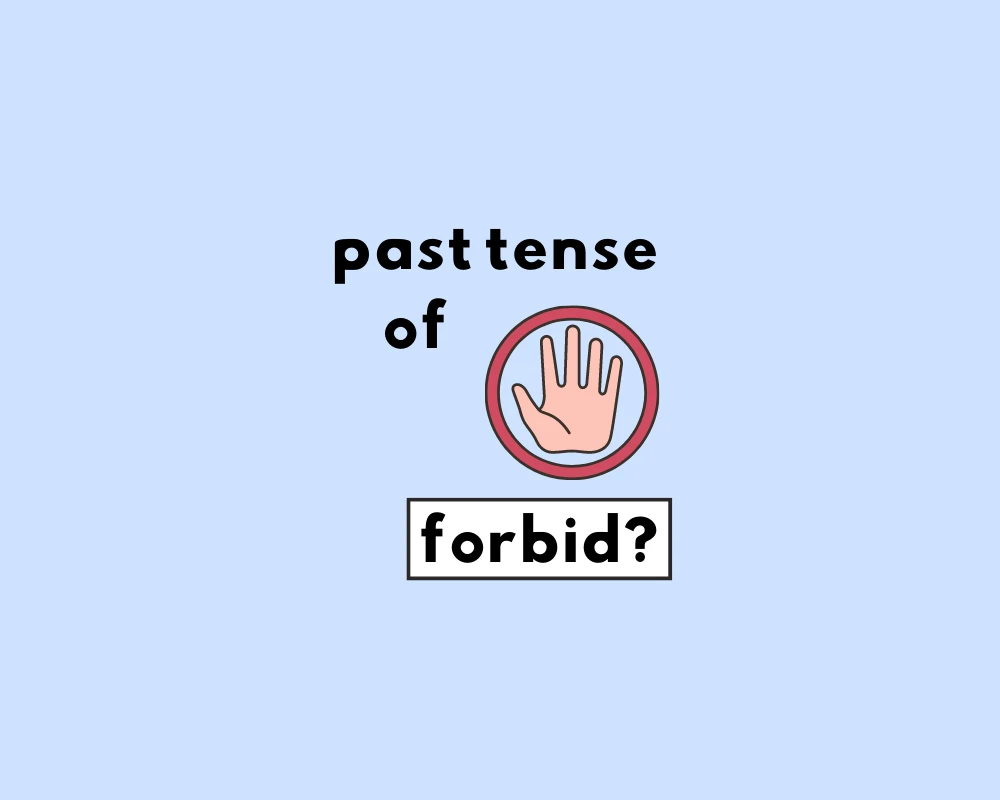What does the word ‘forbid’ mean?
To forbid describes the action of when we, “command (a person) not to do something, have something, etc., or not to enter some place: She forbade him entry to the house.” Forbid is an irregular verb, since neither of its past forms end in –ed. See how forbid conjugates to its other verb forms, in the sections below.
The ancient laws forbade the use of magic within the city walls.
Such behavior is absolutely forbidden in this establishment.
The committee has forbade members from discussing the topic.
The school principal forbidden students from leaving campus during lunch.
What are the tenses of forbid?
| present | past | future | |
| simple | I forbid | I forbade | I will forbid |
| continuous | I am forbidding | I was forbidding | I will be forbidding |
| perfect | I have forbidden | I had forbidden | I will have forbidden |
| perfect continuous | I have been forbidding | I had been forbidding | I will have been forbidding |
Forbid is the present tense: I forbid you from entering the restricted area.
Forbid/forbade is the simple past: The company forbade smoking in the office premises.
Forbidding is the present participle: The teacher, forbidding any distractions, asked the students to put away their cell phones during class.
Forbids is third-person present singular: He forbids his children from watching television on weekdays.
Forbidden is also the past participle: The forbidden fruit tempted Adam and Eve in the Garden of Eden.
What’s the past tense vs. past participle form of forbid?
The simple past tense (forbid/forbade) is used to refer to an event or action that took place and was completed entirely in the past. We would use the participle form of the verb (forbidden) to create other aspects of tense, known as the perfect aspect or tenses in grammar.
To form the perfect aspect in grammar, we pair the past participle form of the verb with an auxiliary verb, like was or had. This is shown in the second sentence since it uses the auxiliary ‘was‘, whereas in the simple past tense there is no auxiliary verb present to supplement the participle.
Past tense: My parents forbade me from attending the late-night party.
Past participle: The sign indicated that photography was strictly forbidden in the museum.
Sentences with forbid in the simple present tense:
I forbid you from using my computer without permission.
She forbids her children from eating junk food.
The school forbids students from wearing hats indoors.
They forbid smoking in all public areas.
The sign clearly forbids parking in this area.
Think of “forbid” as a “forbidden” word that doesn’t follow the usual past tense rules – it’s unique like its meaning!
Sentences with forbade in the simple past tense:
My parents forbade me from going to the party last night.
The law forbade smoking in restaurants until recently.
The school administration forbade students from using cell phones in the classroom.
The company forbade employees from discussing their salaries.
The regulations forbade the use of fireworks in the park.
Sentences that use the past participle, forbidden:
The forbidden fruit symbolizes temptation in many religious texts.
The sign indicated that photography was strictly forbidden in the museum.
The committee has declared certain substances to be forbidden in athletic competitions.
The forbidden knowledge was hidden away in a secret library.
The document contained a list of forbidden items that were not allowed on the airplane.
What are words similar to forbid?
- prohibit
- ban
- bar
- restrict
- disallow
- outlaw
- veto
- prevent
- deny
- hinder
Origin of the verb forbid
From etymology online on forbid (v.):
Old English forbeodan “forbid, prohibit” from for- “against” + beodan “to command”.
Work Sheet
According to the post, why is “forbid” considered an irregular verb?
Which of the following sentences correctly uses the simple past tense of “forbid”?
Which form of “forbid” is used to create perfect tenses (like the present perfect or past perfect) with an auxiliary verb?
According to the post, which sentence is an incorrect usage of the past participle?
Which form is the simple past tense of “forbid”?
My parents me from attending the late-night party.
The sign indicated that photography was strictly in the museum.
She him entry to the house yesterday.
Such behavior has been absolutely in this establishment for years.
The school principal students from leaving campus during lunch. (Choose the correct simple past form)
Frequently Asked Questions
What is the simple past tense of forbid?
+
What is the past participle form of forbid?
+
How do I use ‘forbade’ correctly?
+
How do I use ‘forbidden’ correctly?
+
Is forbid a regular or irregular verb?
+
Yash, D. "What is the Past Tense of Forbid? Forbid, Forbade, Forbidden.." Grammarflex, Jun 22, 2025, https://www.grammarflex.com/what-is-the-past-tense-of-forbid-forbid-forbade-forbidden/.
Sources
-
1. Harper, Douglas. “Etymology of forbid.” Online Etymology Dictionary, https://www.etymonline.com/word/forbid. Accessed 30 May, 2023.











